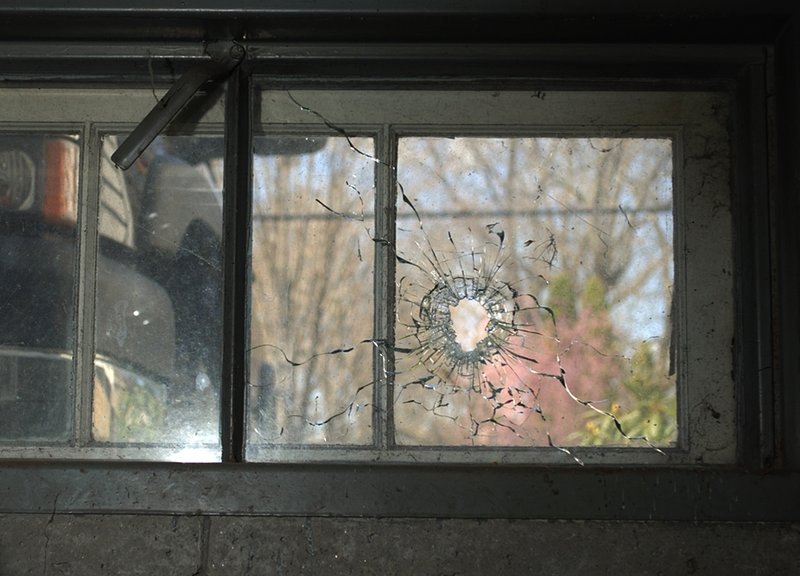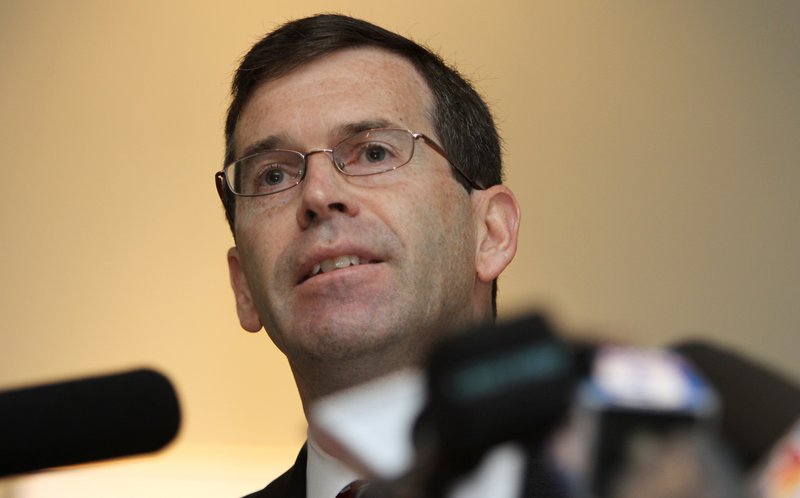CONCORD, N.H. – New Hampshire’s attorney general is critical of several decisions made by undercover drug task officers in the moments leading up to an April shootout in which Greenland Police Chief Michael Maloney was killed and four officers were wounded.
Attorney General Michael Delaney says the undercover officers obtained a no-knock warrant to search the home of 29-year-old Cullen Mutrie for drugs, but opted instead to knock on the door in hopes of drawing Mutrie out.
When Mutrie did not respond, Delaney says, the officers hit the front door with a battering ram up to six times before the sturdy door gave way. Mutrie immediately started firing and wounded two of the three officers on the porch. He then retreated to the basement of the house when officers returned fire. It was from there, Delaney said, that Mutrie fired the shot through the basement window that hit Maloney in the head as he peered over the front fender of his cruiser.
Maloney had driven his cruiser to the front of the house to provide cover for the injured officers and a barrier from which officers could return fire, Delaney said. Maloney, 48, was just days away from retirement when he was shot.
Delaney revealed details of the state police investigation into the shootings and the findings of an independent Greenland Incident Review panel at a news conference Friday.
Delaney said the drug task force team leader — Newmarket Detective Scott Kukesh — was late to the pre-raid briefing because he was on a security detail for a visit by Vice President Joe Biden earlier on April 12.
The commission questioned why the warrant was executed in haste when it would have been valid for another four days. The report noted that Kukesh had worked since very early in the morning on the security detail for Biden. Commission members were also critical of the time of the operation — just after 6 p.m. — when darkness made it difficult to discern silhouettes of those inside.
In addition to the search warrant for the home, police were armed with an arrest warrant for Mutrie’s acquaintance, Brittany Tibbetts, on drug charges. After the shootout, Delaney said, Mutrie shot Tibbetts in the head and killed himself. Delaney said 27 grams of cocaine, three vials of anabolic steroids and seven grams of hallucinogenic mushrooms were found in the home. Tibbetts had about $14,000 in cash hidden in her clothing.
While holed up in the basement, state police detective Sgt. Joe Ebert said, Mutrie called a friend and told him he had shot and may have killed two police officers, and that he wasn’t leaving the home. Tibbetts sent a text message to her mother telling her she loved her “more than you’ll ever know” and saying she did nothing wrong. Ebert said Mutrie and Tibbetts both had narcotics and opiates in their systems, and Mutrie had ingested steroids.
Delaney said there were “deficiencies” in the supervision of the Seacoast drug task force, in the planning and execution of their mission and in policies and procedures.
He said the undercover officers had cellphones but were not carrying police radios to summon help. The team did not ascertain in advance whether Mutrie was inside the house, Delaney said, citing the commission report and the state police investigation.
Despite Mutrie’s criminal record and history of violent behavior, the task force made no formal request for assistance from the Seacoast Emergency Response Team or state police.
Delaney said that in the future, police tactical teams would be involved in the execution of all no-knock warrants. He said the undercover officers assigned to the four regional drug task force teams would receive special tactical training. Those teams are supervised by the Attorney General’s Office.
Delaney said that the four regional drug task forces at the time of the Greenland shootings did not use a risk threat assessment matrix prior to executing warrants. He said that is now standard operating procedure.
He called the decision to forcibly enter the house “a last minute plan.”
Delaney said the supervisor of the statewide drug task force was on vacation and that no senior command staff members were consulted in advance of the fatal raid.
Delaney praised the courage and heroics of the officers “who sacrificed so much on April 12.”
“I am confident the lessons we have learned will strengthen our operation and decrease the risk of an incident like this happening again,” Delaney said.New Hampshire Attorney General Michael Delaney said there were “deficiencies” in the supervision of the Seacoast drug task force, in the planning and execution of their mission and in policies and procedures.
Send questions/comments to the editors.




Success. Please wait for the page to reload. If the page does not reload within 5 seconds, please refresh the page.
Enter your email and password to access comments.
Hi, to comment on stories you must . This profile is in addition to your subscription and website login.
Already have a commenting profile? .
Invalid username/password.
Please check your email to confirm and complete your registration.
Only subscribers are eligible to post comments. Please subscribe or login first for digital access. Here’s why.
Use the form below to reset your password. When you've submitted your account email, we will send an email with a reset code.